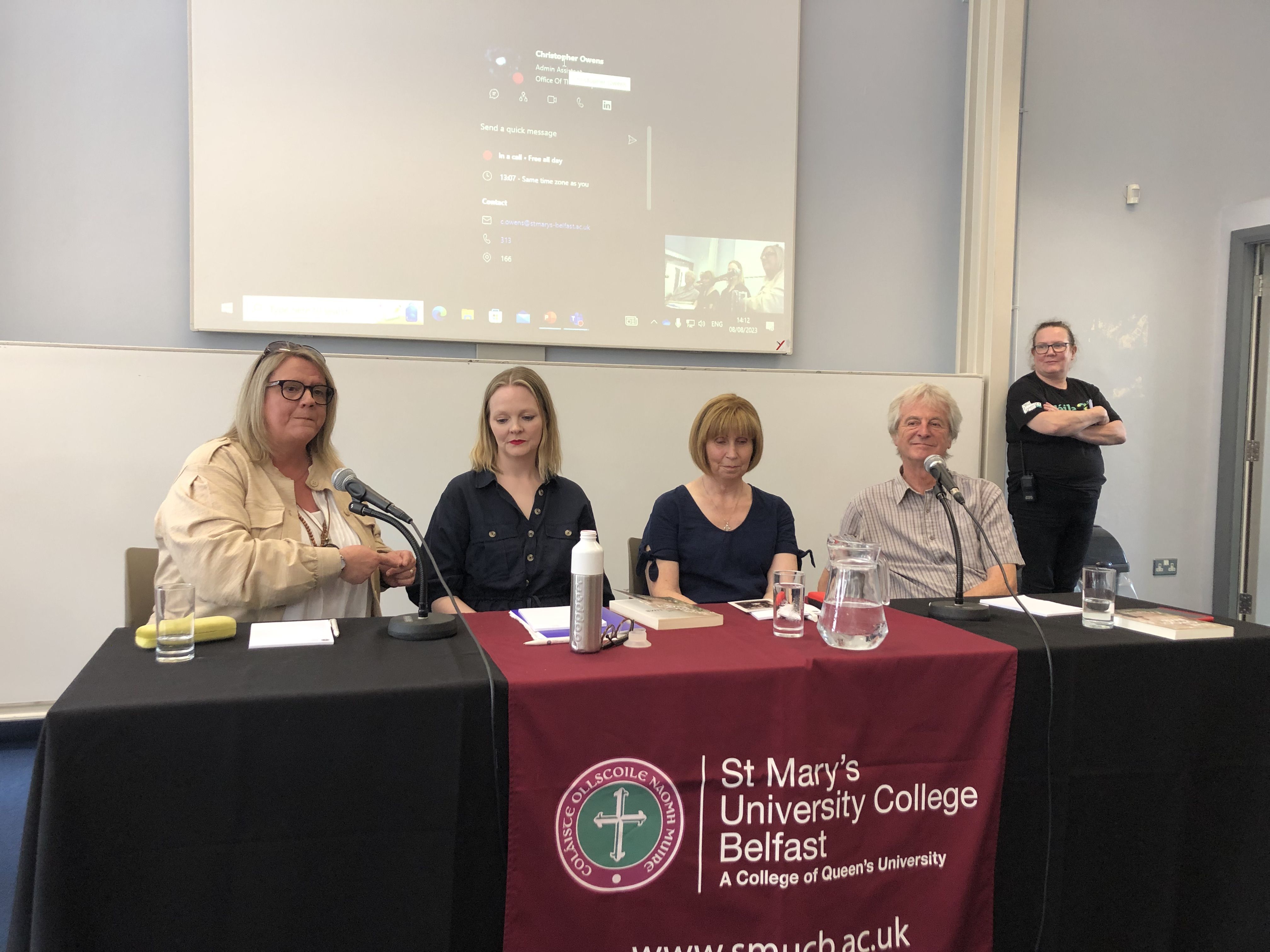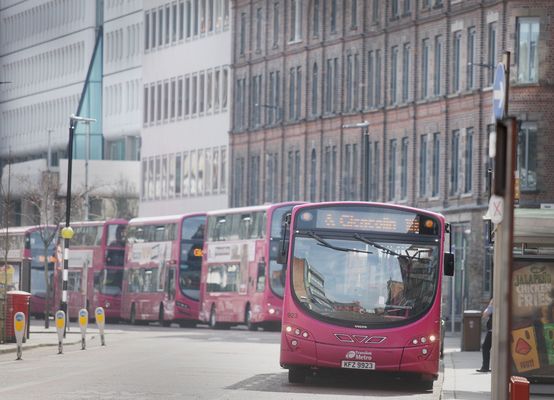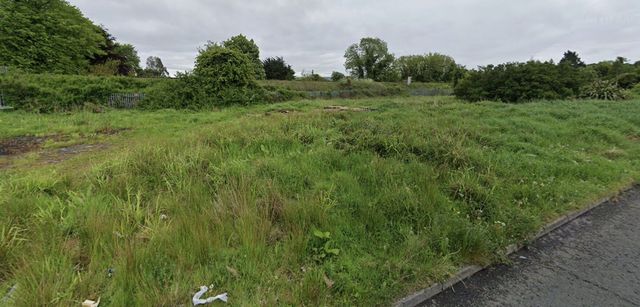THREE prominent Protestant women have spoken during Féile about what it means to be Protestant yet rejecting the traditional narratives of Protestantism in the North.
'The Ghost Limb: Stories of Alternative Protestant Lives' at St Mary’s University College was packed out, with another room having to be opened next door to accommodate the audience which was chaired by Senior Sociology lecturer Bill Rolston. The talk focused on the book written by Claire Mitchell with contributions from Linda Ervine and Reverend Karen Sethuraman.
Claire spoke about writing her book over lockdown and of exploring the areas of East Belfast and North Down prominently associated with the 1798 rebellion, whose memory and lasting legacy runs through the book while asking herself and her fellow contributors what happened to spirit of 1798 in Northern Protestant communities and what shape is it in today?
This time last year, I was racing to finish book edits & sending @BooksBtp crazy cover ideas.
— Claire Mitchell (@mrstooth) August 7, 2023
Can’t wait to sit down and reflect on almost a year of The Ghost Limb, with two women I look up to immensely, and whose stories help form the beating heart of the book.
Come join us! https://t.co/rXRM9RDVlk
Poignantly written, Claire has written a narrative in which she explains how Protestants with an alternative outlook or upbringing based on tolerance and anti-sectarianism can feel stifled in their own communities in which importance is placed on loyalty to the union, the British identity and flags.
Claire said: "I remember going through Newtownards and a banner said 'Newtownards Supports Soldier F' and I remember thinking 'Do they?' I sometimes felt like I couldn't breathe and I decided to start the journey of retracing the footsteps of the United Irishmen and their belief in Protestants, Catholics and Dissenters but I knew I couldn't just talk about the dead, I had to speak to the living too."
Uppa Rebels ✊🏻#FearlessWomen #Spiritof1798
— Glenn Bradley (@BradleyGJ) August 8, 2023
All ready for “The Ghost Limb” event here in @StMarys_Belfast as part of @FeileBelfast
An honour to know these fellow travellers @KarenSethuraman @ErvineLinda @mrstooth pic.twitter.com/xM604aw2TZ
Linda Ervine spoke about her experiences of having a Catholic grandmother and a family history which was long associated with the Communist Party. Linda said during the conflict she temporarily lived with her father who was then living in Twinbrook and experienced sectarianism first-hand but it never dampened her sense of Irishness.
Linda said: "I don't know when it happened but it wasn't until I was in my 30s that people started saying, 'I'm not Irish, I'm British' whereas before they would have happily have said they were Irish. I feel conflicted towards calling myself a unionist because I hate what that represents, I can't bear the DUP, they have never represented my views which aren't right-wing, anti-Catholic or anti-Irish.
"I feel if you deny your Irishness you're saying you're an usurper here and saying you don't somehow belong, but I do belong, I am from here. I sometimes feel a lot of Protestants know what they're not far more than they know what they are."
Reverend Karen spoke about her upbringing in East Belfast and being raised alone by her mother who taught her to live life to the full but said the conformity of the local area wasn't good as she would always question things.
Something Is Afoot. Ghost Limb @ Féile. Kicking With The Right Feet. Capacity Audience. pic.twitter.com/J2D1VYAfjP
— Gerry Adams (@GerryAdamsSF) August 8, 2023
"I fell in love with people, with other histories, other people and other communities which I was never taught anything about and I think we all have to live here with our different narratives," she said.
The three women were asked how they got to where they are now to which Claire said she felt a lot of people felt the same but feel afraid of speaking out and talked about the online abuse which had been directed at the three women for being 'Lundys' or worse. Claire said it was important to find the positive identities which can be seen in 1798 and said that although there were differing opinions on Ireland's constitutional future, all agreed that they didn't feel at home in the narrative political unionism had built for itself.
Reverend Karen said she felt compelled to work outside the walls of the traditional church and when first ministering was told to do it within her own community, which she did not agree with.
Linda Ervine said her Irish identity was a natural progression and that she had spent much of her life feeling powerless and voiceless. Linda said she was first shocked at the hostility to the Irish language and wanted more people to know that although she has no problem with the Orange Order, not every Protestant should be thought of as being a member, adding: "The Orange Order have never represented me or the views of anyone within my family and if you look, most Protestants aren't a member but it is that image which is used to define our identities."
In the Question and Answer session following the talk, Tom, a Protestant from East Belfast asked the panel whether there was a chance of another person like David Ervine coming along and what hope there was for young people in East Belfast who are stuck in communities which are fed division.
Another full house at @StMarys_Belfast this afternoon for Ghost Limbs: Stories of Alternative Protestant Lives.
— Féile an Phobail (@FeileBelfast) August 8, 2023
Record attendances at Féile debates and discussions in this 35th anniversary year. pic.twitter.com/GTN79yeyq3
Linda Ervine said: "I don't think there is a lot of political hope at the moment. I don't really have any politcal party at the moment which I agree with but I do believe in cross-community relations. I think there is a lot of hopelessness and I think a lot of young people are fed division to maintain control and I don't see a lot of change coming there soon."
Reverend Karen said that too often the negative voices from the Protestant community are highlighted and said the positive voices should be heard and to move forward with friendship and compassion for each other.
Claire added that sometimes opening up these discussions was "the conversational equivalent of a fart" but we should all learn more about our shared history and how we are all part of the fabric of this island.
Linda Ervine added: "We are a big part of this island and I think when partition happened the South strove to reject everything that was British and Northern Ireland sought to reject everything that was Irish and I believe that hasn't been good for anyone."







